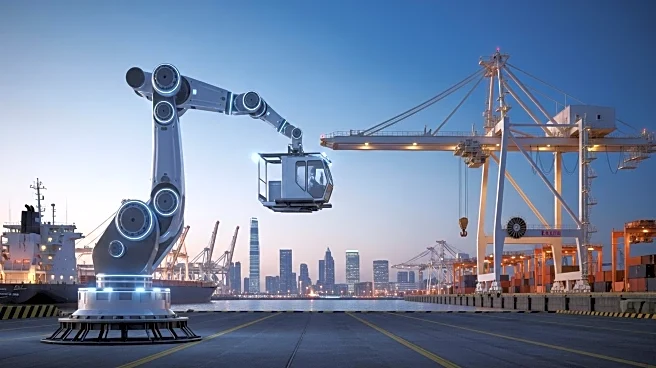What is the story about?
What's Happening?
Singapore is actively redesigning roles within its maritime industry to adapt to the increasing influence of automation and artificial intelligence. The city-state, known for its global maritime hub status, is focusing on reskilling and upskilling its workforce to ensure it remains competitive in a rapidly digitalizing sector. Initiatives such as the Management Associates scheme and scholarships via the Singapore Maritime Foundation are being implemented to support a more digitalized, high-tech, and sustainable maritime industry. These programs aim to provide students with degrees, part-time work, and full-time jobs upon graduation, thereby securing a talent pipeline for the future.
Why It's Important?
The maritime sector is a significant contributor to Singapore's economy, accounting for around 7% of GDP and employing over 170,000 people. As the industry undergoes a green transition and Tuas Port comes online, the demand for skilled talent is expected to grow. By investing in education and training, Singapore aims to maintain its leadership in maritime operations while addressing the challenges posed by technological advancements. This strategic approach not only supports economic growth but also positions Singapore as a leader in sustainable maritime practices, potentially influencing global standards.
What's Next?
Singapore's maritime industry is at a crossroads, with the need to balance technological integration with workforce development. The focus will be on enhancing training programs and leveraging tertiary education institutions to build a future-ready workforce. As automation and AI reshape job descriptions, the emphasis will be on maintaining essential skill sets and ensuring that information and analysis are effectively translated into business decisions. The collaboration between government, academia, and industry will be crucial in achieving these goals and ensuring the sector's long-term resilience.
Beyond the Headlines
The shift towards a more digitalized maritime industry in Singapore highlights broader implications for global maritime practices. As Singapore integrates AI and automation into its workforce, it sets a precedent for other maritime hubs to follow. This transition also raises questions about the future of maritime identity and how traditional roles will evolve in the face of technological change. The challenge lies in making maritime careers appealing to younger generations, who seek purpose, flexibility, and visibility in their professional lives.


















